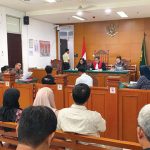Jakarta (Greeners) – Increased transportation activities have triggered for air pollution in cities, said Minister of Environment and Forestry, Siti Nurbaya, in Jakarta, on Saturday (24/12).
“Seventy percent of pollution in the cities is from transportation sector. With high use of fossil fuel for transportation, the sector is responsible to reduce greenhouse gas emission which contributes to global warming,” said Minister Siti.
In 2020, half of Indonesia’s population will be living in the cities leading to increase transportation, 12 percent per year, dominated by motorcycles. It will cause new problems, not just traffic jams but also road accidents, air pollution and noise pollution.
READ ALSO: New Research Reveals Indonesia’s Carbon Emission is Less Than IPCC Report
To tackle the issue, she added that green transportation must be planned without reducing economic and social activities for urban dwellers.
The principle of green transportation is to encourage mobility and accessibility without adding more burden to economics and environment. Promoting green transportation will also provide health protection as it would reduce air pollution in the cities.
“Green transportation also creates healthy habit by giving more choices of transportation aside from vehicles,” she said.
READ ALSO: Switzerland Shows Interest to Invest Renewable Energy in Indonesia
Meanwhile, Director General of Pollution Control and Environmental Damage at the Ministry, Karliansyah, said that air pollution this year was constant compare to 2015.
“In 2016, hydrocarbon had reached past the benchmark was found in Medan city. In addition, 14 cities did not implement Cities Air Quality Evaluation, — Bandung, Bekasi, Depok, Bogor, Surabaya, Tangerang, Malang, South Tangerang, Jayapura, Manokwari, Kendari, Ternate, Palangkaraya, and Pangkal Pinang,” said Karliansyah.
Furthermore, he said the evaluation provided information on air quality, performance and competitiveness of cities for air quality management and green transportation, also to serve as guidance for cities to improve their air quality.
In addition, the evaluation could guide and provide input in the policies and strategies on air quality also act as government’s accountability on their air quality management in the cities.
READ ALSO: Experts and Activists Weight In on Plans to Eliminate Environmental Impact Analysis
Karliansyah said there were few components to push for better air quality, such as clean fuels, which improve the vehicles and reduce air pollution.
“We are coordinating with other ministries/agencies to immediately apply EURO 4 policy,” he said. “With this policy, green fuel will be available, which is sulfur with below 50 ppm.”
Next, he said, is shifting to public transportation by increasing cheaper, safer and comfortable public transportation.
Reports by Danny Kosasih



















































